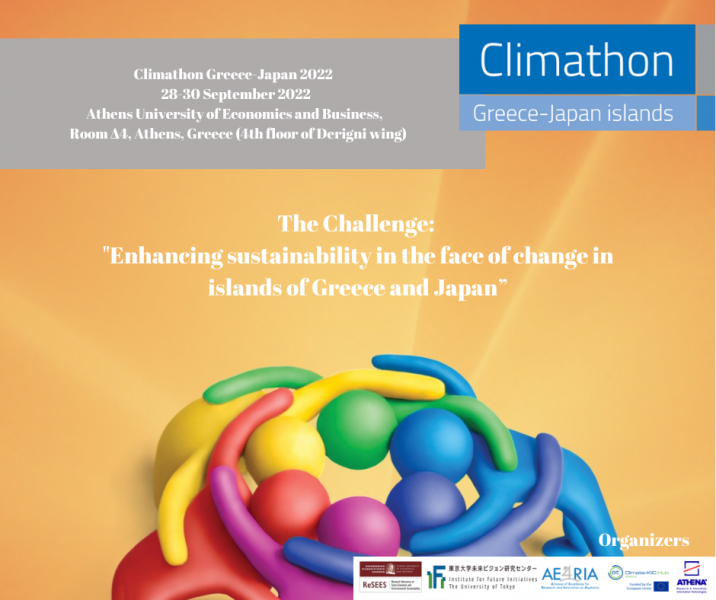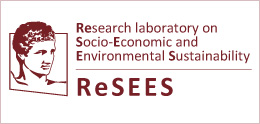A 48-hour Climathon on Sustainable Islands in Greece and Japan | The Challenge: "Enhancing sustainability in the face of change in islands of Greece and Japan''

Islands are social-ecological systems with unique characteristics shaped by their often-extreme remoteness from mainland areas. Many islands host unique and highly endemic ecosystems that have evolved over millennia. Similarly, many islands are homes to very distinct cultures and social systems, containing local communities that have strong values and sense of place. Indeed, islands are considered hotspots of biocultural diversity.
However, islands also face very pronounced demographic, socioeconomic and environmental change that affects their social-ecological components, and gives rise to very interconnected sustainability challenges.
The Challenge: " Enhancing sustainability in the face of change in islands of Greece and Japan”
Each team will be asked to either propose:
(a) a unique solution to a single small island in Greece or Japan if it targets a very specific local issue or reflects a unique local context, or
(b) a solution with broader applicability in multiple islands of Greece or Japan if it targets a more generic issue.
Indicatively, teams can suggest solutions on:
- How can islands become self-sufficient? Which technologies/infrastructures are needed?
- How to enhance the economic competitiveness of islands in a sustainable manner? What support is needed from the Government, Private sector or other stakeholders?
- How can tourism become more sustainable? Are there any existing initiatives? How could they be directed in supporting the island(s) of your choice?
- What is needed to “convince” younger people to remain on islands? Which opportunities could be identified?
- Each team is expected to develop a 3-5 min presentation of their proposed plan that will be given on Friday 30 September.
The best teams will receive small prizes
Teams can consult and receive feedback from the Climathon mentors during the morning of Friday 30 September.
 Dr Alexandros Gasparatos is an Associate Professor of Sustainability Science at the Institute for Future Initiatives (IFI), University of Tokyo. He is an ecological economist interested in the development, refinement and application of sustainability assessment and ecosystem services valuation tools. He has applied such tools in different topics such as food security, renewable energy, energy policy, green economy, and urban metabolism, in geographical contexts as diverse as Bangladesh, Brazil, China, Ghana, Indonesia, Japan, Kenya, Malawi, Malaysia, Mozambique, Myanmar, Swaziland and the UK.
Dr Alexandros Gasparatos is an Associate Professor of Sustainability Science at the Institute for Future Initiatives (IFI), University of Tokyo. He is an ecological economist interested in the development, refinement and application of sustainability assessment and ecosystem services valuation tools. He has applied such tools in different topics such as food security, renewable energy, energy policy, green economy, and urban metabolism, in geographical contexts as diverse as Bangladesh, Brazil, China, Ghana, Indonesia, Japan, Kenya, Malawi, Malaysia, Mozambique, Myanmar, Swaziland and the UK.
 Dr Shamik Chakraborty is a Lecturer at the Department of Sustainability Studies, Hosei University. He is a human geographer that studies human-environment interaction from a social-ecological systems point of view. He has worked with the concepts of social-ecological systems, indigenous and local knowledge, and ecosystem services valuation in diverse ecosystems in Japan, India, Nepal, Bangladesh and the Philippines. His current research interest is the contact points of human society with the diverse sets of benefits derived from different terrestrial and coastal environments for biodiversity conservation, climate change adaptation, and sustainable development.
Dr Shamik Chakraborty is a Lecturer at the Department of Sustainability Studies, Hosei University. He is a human geographer that studies human-environment interaction from a social-ecological systems point of view. He has worked with the concepts of social-ecological systems, indigenous and local knowledge, and ecosystem services valuation in diverse ecosystems in Japan, India, Nepal, Bangladesh and the Philippines. His current research interest is the contact points of human society with the diverse sets of benefits derived from different terrestrial and coastal environments for biodiversity conservation, climate change adaptation, and sustainable development.

Dr Ebun Akinsete is a Senior Researcher at the Sustainable Development Unit, ATHENA RC and the Head of the Department of Stakeholder Analysis and Decision Support Systems at ICRE8 and UN SDSN Greece. She is an Associate Lecturer at the School of Applied Social Studies, Robert Gordon University (Aberdeen), and a Senior Partner with Nigerian-based consultancy GEN Sustainable Solutions. With a BSc (Hons) in Architectural Technology, MSc in Project Management and PhD in Urban Regeneration and Sustainable Communities, she has several years of both industrial and academic experience in Europe, Asia and Africa; collaborating with governmental agencies, NGOs, aid organizations, academic institutions, the private sector and local communities. Her main areas of interest are sustainable development, urban regeneration, SDG policy and implementation, community development, climate change mitigation, transition management, renewable energy, stakeholder participation, participatory planning, evaluation and impact assessment for sustainability, and sustainability in developing nations.
 Ms Maria Loloni is a maritime economist, with a focus on circularity and the blue economy and maritime sectors. Throughout her career in European Institutions, Global Associations and the private sector, she has worked with diverse stakeholders to build collaborative communities, design transformative strategies and bring these to life. Maria loves leading teams and programmes that change our current way of living into a zero-emission, circular just and inclusive paradigm, in harmony with natural cycles and patterns.
Ms Maria Loloni is a maritime economist, with a focus on circularity and the blue economy and maritime sectors. Throughout her career in European Institutions, Global Associations and the private sector, she has worked with diverse stakeholders to build collaborative communities, design transformative strategies and bring these to life. Maria loves leading teams and programmes that change our current way of living into a zero-emission, circular just and inclusive paradigm, in harmony with natural cycles and patterns.
 Ms Lydia Papadaki is a PhD candidate at the Athens University of Economics and Business (Scholarship awarded by the Academy of Athens). She is the Co-Manager of EIT Climate-KIC Hub Greece. She is a researcher at the Alliance of Excellence for Research and Innovation on Αephoria (AE4RIA) participating in several EU-funded projects. Lydia has organized more than 30 participatory workshops and seminars and she has prepared and delivered lectures, seminars and environmental awareness-raising programs addressed to different audiences, including all educational levels and the wider public. She received her M.Sc. in Economics and policy of Energy and the Environment at University College London (UCL), and her BSc (Distinction) in Economic theory and policy at Athens University of Economics and Business (AUEB). Lydia was engaged in the AUEB debating club as a debater, committee and after as a judge in Greek and International Championships (EUDC 2016, PiXL "Up For Debate" competition). Her main areas of interest are economics, environmental economics, circular economy, blue growth, systems innovation, stakeholders engagement and sustainable development.
Ms Lydia Papadaki is a PhD candidate at the Athens University of Economics and Business (Scholarship awarded by the Academy of Athens). She is the Co-Manager of EIT Climate-KIC Hub Greece. She is a researcher at the Alliance of Excellence for Research and Innovation on Αephoria (AE4RIA) participating in several EU-funded projects. Lydia has organized more than 30 participatory workshops and seminars and she has prepared and delivered lectures, seminars and environmental awareness-raising programs addressed to different audiences, including all educational levels and the wider public. She received her M.Sc. in Economics and policy of Energy and the Environment at University College London (UCL), and her BSc (Distinction) in Economic theory and policy at Athens University of Economics and Business (AUEB). Lydia was engaged in the AUEB debating club as a debater, committee and after as a judge in Greek and International Championships (EUDC 2016, PiXL "Up For Debate" competition). Her main areas of interest are economics, environmental economics, circular economy, blue growth, systems innovation, stakeholders engagement and sustainable development.
 Dr Ebun Akinsete is a Senior Researcher at the Sustainable Development Unit, ATHENA RC and the Head of the Department of Stakeholder Analysis and Decision Support Systems at ICRE8 and UN SDSN Greece. She is an Associate Lecturer at the School of Applied Social Studies, Robert Gordon University (Aberdeen), and a Senior Partner with Nigerian-based consultancy GEN Sustainable Solutions.
Dr Ebun Akinsete is a Senior Researcher at the Sustainable Development Unit, ATHENA RC and the Head of the Department of Stakeholder Analysis and Decision Support Systems at ICRE8 and UN SDSN Greece. She is an Associate Lecturer at the School of Applied Social Studies, Robert Gordon University (Aberdeen), and a Senior Partner with Nigerian-based consultancy GEN Sustainable Solutions.
 Dr Alexandros Gasparatos is an Associate Professor of Sustainability Science at the Institute for Future Initiatives (IFI), University of Tokyo. He is an ecological economist interested in the development, refinement and application of sustainability assessment and ecosystem services valuation tools.
Dr Alexandros Gasparatos is an Associate Professor of Sustainability Science at the Institute for Future Initiatives (IFI), University of Tokyo. He is an ecological economist interested in the development, refinement and application of sustainability assessment and ecosystem services valuation tools.
 Dr Shamik Chakraborty is a Lecturer at the Department of Sustainability Studies, Hosei University. He is a human geographer that studies human-environment interaction from a social-ecological systems point of view.
Dr Shamik Chakraborty is a Lecturer at the Department of Sustainability Studies, Hosei University. He is a human geographer that studies human-environment interaction from a social-ecological systems point of view.
 Mr Bjarke Kovshøj is a Strategic Programmes Orchestrator. Bjarke has worked with climate change in cities for 8 years through various projects including Smart City Data Platform, C40 City Solutions Platform and lastly Climathon.
Mr Bjarke Kovshøj is a Strategic Programmes Orchestrator. Bjarke has worked with climate change in cities for 8 years through various projects including Smart City Data Platform, C40 City Solutions Platform and lastly Climathon.
 Ms Lydia Papadaki is a PhD candidate at the Athens University of Economics and Business (Scholarship awarded by the Academy of Athens). She is the Co-Manager of EIT Climate-KIC Hub Greece. She is a researcher at the Alliance of Excellence for Research and Innovation on Αephoria (AE4RIA) participating in several EU-funded projects.
Ms Lydia Papadaki is a PhD candidate at the Athens University of Economics and Business (Scholarship awarded by the Academy of Athens). She is the Co-Manager of EIT Climate-KIC Hub Greece. She is a researcher at the Alliance of Excellence for Research and Innovation on Αephoria (AE4RIA) participating in several EU-funded projects.
Learn more: Climathon Greece-Japan 2022-AGENDA Climathon Greece-Japan 2022-CHALLENGE




 76 Patission Str.
76 Patission Str. 30 2108203 455
30 2108203 455
